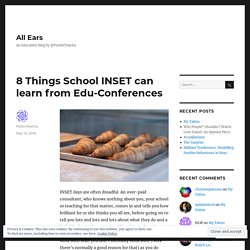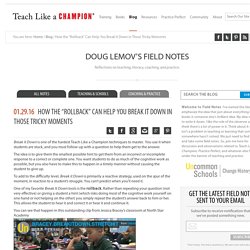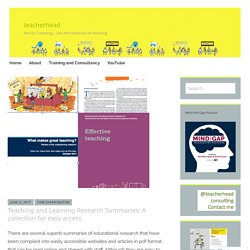

Rosendale Action Research. 8 Things School INSET can learn from Edu-Conferences. INSET days are often dreadful.

An over-paid consultant, who knows nothing about you, your school or teaching for that matter, comes in and tells you how brilliant he or she thinks you all are, before going on to tell you lots and lots and lots about what they do and a little bit about what you should be doing. Then, later on, you are split into groups where you are forced to work with staff you don’t normally work with (Note-there’s normally a good reason for that) as you do some useless mind-mapping exercise in which you come up with ideas about ‘engaging students’ or, even worse, ‘behaviour strategies.’ I know all this because teachers are keen to vocalise their disdain for the INSET they are provided with, in the form of tortured scribblings (scrawled across the back of print-out of a presentation on last year’s progress data), or in the form of venomous rants offered up on the way to the free ham sandwiches. 1. Provide Refreshments 2. 3. 4. 5. 6.
Has a solution to retention been found? Interrupting the forgetting – Last lesson, Last week, Last month – The Mill Primary-Teaching Top Trumps. Durrington Research School. 15 myths about memory and learning. Useful Links. Bridging Cognitive Science and the Classroom Sites and Blogs: The Learning Scientists - a site and blog by cognitive psychologists who work to improve education by advocating science-based learning strategies.

List of articles by prof. Putting Evidence to Work - A School’s Guide to Implementation. How the "Rollback" Can Help You Break It Down in Those Tricky Moments. Break it Down is one of the hardest Teach Like a Champion techniques to master.

You use it when students are stuck, and you must follow-up with a question to help them get to the answer. The idea is to give them the smallest possible hint to get them from an incorrect or incomplete response to a correct or complete one. You want students to do as much of the cognitive work as possible, but you also have to make this to happen in a timely manner without causing the student to give up. To add to the difficulty level, Break it Down is primarily a reactive strategy, used on the spur of the moment, in reaction to a student’s struggle. 10721 impact article optimising learning using retrieval practice. Welcome to MESHGuides. BW-Research-Engaged. Lessons from Practice Perfect. Following on from Lessons from Fierce Conversations, here are some lessons from the book Practice Perfect by Lemov, Woolway and Yezzi.

In the book, they set out forty two principles for effective talent development through practice. The book crosses a number of areas of talent (sports, music and medicine for example) but focuses in particular on how to develop effective teachers. The summary notes below, which I made whilst reading the book about five years ago, outline the forty two principles. The concepts are based around a model of whole staff practice in training sessions, practice during coaching sessions and practice during actual lessons. Looking back, I now realise that this book was pivotal in terms of influencing how I’ve attempted to develop the CPD process for teachers at our school, just as Teach Like a Champion was vital in informing our teaching model.
Rethinking Practice 1 Encode success Establish what success looks like, breaking it down into small parts. 11 Name it 14. Retrieval and encoding: getting off to a good start. Less is more… I’ve been writing a lot about cognitive architecture and instructional design of late (here, here and here).

Arguably, the goal of instruction is to help students be able to explain information that they’ve retained and to transfer this to solve problems. Here I want to discuss a method of instructional design which may be highly effective in supporting learners with not only their retention of information, but also transfer. According to Mayer et al (1996): Analysis: For Ed Tech That Actually Works, Embrace the Science of Learning.
This is the second in a series of essays surrounding the EdTech Efficacy Research Symposium, a gathering of 275 researchers, teachers, entrepreneurs, professors, administrators, and philanthropists to discuss the role efficacy research should play in guiding the development and implementation of education technologies.

This series was produced in partnership with Pearson, a co-sponsor of the symposium co-hosted by the University of Virginia’s Curry School of Education, Digital Promise, and the Jefferson Education Accelerator. Read the first piece here. As education technology gains an increasing presence in American schools, the big question being asked is, “Does it work?” But as curricula and learning tools are prepared for rigorous evaluation, we should think about how existing research on teaching and learning have informed their design. Insights into assessment from ‘What Does This Look Like in the Classroom’ Research Bites – Elaborative Interrogation.
Why did a small, badly designed experiment make me change my teaching forever? – Walden Education. Teaching and Learning Research Summaries: A collection for easy access. There are several superb summaries of educational research that have been compiled into easily accessible websites and articles in pdf format that can be read online and shared with staff.

Although they are easy to find via an internet search, I am pulling them together into one place for easy access. I’ll keep adding to it as I find things and when people make suggestions: John Dunlosky: Strengthening the Student Toolbox Barak Rosenshine: Principles of Instruction See also: Rosenshine Re-ordered. Rob Coe et al: What makes great teaching. 5 Quick Videos To Refresh Your Teaching Practice. Here at Teaching Channel, we regularly film lessons from teachers all over the country.

But while we’re out filming, so much more than just lessons are captured. We see how teachers use classroom management strategies, put powerfully effective charts on their walls, and encourage kids to engage in productive discussions. Research Bites – Retrieval Practice. Why does sharing learning intentions matter? Teaching and Learning Research Summaries: A collection for easy access. Log in - TeachingHOW2s. Retrieval Practice. Interleaving presentation. Co constructed Success Criteria 20171027155048.